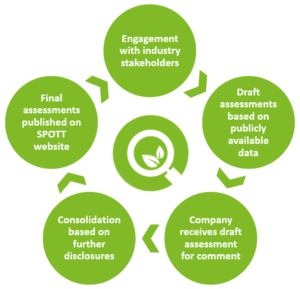The rapid expansion of rubber monocultures in recent decades has resulted in similar environmental and social impacts – such as deforestation and land grabbing – to those caused by other plantation-based commodities, but has received far less attention than other sectors. This is now beginning to change, with sector-wide sustainability initiatives and company commitments being developed to address the possible impacts of natural rubber production.
Growing sustainability challenges in the natural rubber sector will require a strong and unified response from businesses in the rubber supply chain, their investors, governments, and civil society organisations that monitor and engage with these actors. The environmental and social issues associated with rubber production and processing represent financial, regulatory and reputational risks to both the downstream companies and financial institutions involved. To respond to these risks, greater industry transparency will be required in order to bring about targeted change.
SPOTT is therefore expanding to include natural rubber and will apply its tried and tested methodology for assessing the transparency of producers and processors in the sector.
Company selection
Taking into consideration the needs of SPOTT users, and aiming to identify companies and geographies with leverage to drive positive impact, we selected 15 natural rubber producers and processors based on the following general considerations:
- Area of land owned or leased
- Market capitalization
- Nominated by interested stakeholders from the finance sector, buyers, and other SPOTT users (optionally anonymous)
- Operations also in the palm oil or timber and pulp sectors and assessed on SPOTT
Selected companies
ZSL has notified the selected companies regarding their forthcoming assessment on SPOTT and invited them to participate in the consultation on the indicator framework that will be used for assessment.

Nominate rubber producers
Please contact us if you would like to nominate a natural rubber company that you would like to see assessed on SPOTT.
Indicator framework consultation
ZSL is currently conducting a consultation on the environmental, social and governance (ESG) indicators that will be used to assess natural rubber companies. The natural rubber indicator framework is based on the existing palm oil and timber and pulp frameworks which were developed following extensive consultation with stakeholders including Technical Advisory Groups, producers, trade bodies, finance and buying company representatives, NGOs, and other industry experts. The SPOTT indicator framework also reflects and complements the expectations set out in other frameworks and guidelines for sustainable production, such as FSC, GPSNR, CCCMC, AFi, GRI and UNGC.
Companies do not report directly to ZSL to inform their SPOTT assessments. Rather, ZSL conducts a thorough review of publicly available reports and publications before contacting the companies with their draft assessments. This engagement process ensures that assessed companies have the opportunity to provide feedback to ZSL and make further disclosures ahead of the final review and publication of assessments on SPOTT.
The indicator framework guides the SPOTT team when undertaking assessments of company transparency. The purpose of the indicator framework is two-fold:
- To ensure a fair, consistent and transparent approach to assessing all companies on SPOTT;
- To provide guidance on the type of environmental, social and governance data companies should publish.
The current consultation is ongoing until 12 July. Please download a copy of the consultation document to take part.
* These companies are also assessed on SPOTT in relation to their palm oil operations. Groupe Blattner Elwyn is also assessed in relation to its timber and pulp operations.
** Update 22/07/2019: As they do not have significant operational rubber plantations, Michelin and Top Glove Malaysia have been deselected, and Indofood Agri and Groupe Blattner Elwyn have been included in their place.
Banner image credit: Neil Palmer (CIAT) on Flickr CC BY-SA 2.0
